- 1 hour ago
- Asia
-
(아시아) 맨부커(Man Booker) 수상작 번역자는 어떻게 한국어를 배워서 수상하게 되었나?국제문제/아시아 2016. 5. 17. 19:32
출처: http://www.bbc.com/news/world-asia-36309105
The Vegetarian: How to learn Korean and win awards
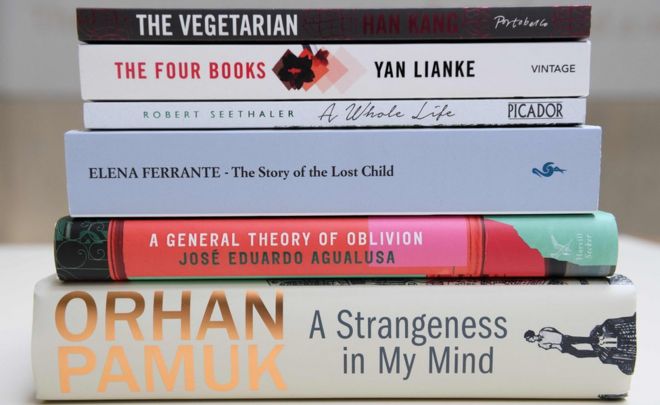 AFP
AFPThere were six books up for the prize - this year awarded for a single work, for the first time 수상후보 6 작품. 금년으로 처음으로 단일 작품을 시상한 경우. South Korean writer Han Kang has won the Man Booker International Prize for her novel The Vegetarian, but shares the prize with the translator of the book, Deborah Smith, who only began learning Korean in 2010. The BBC's Steve Evans in Seoul asks how hard Korean really is to learn.
There will be some who argue that Sejong the Great, at his prime in 1444, could rightfully deserve a cut from the proceeds of the Man Booker International prize. (at one's prime: 전성기에) (a cut: 몫, 배당) (proceeds: 수익금)
The king's statue stands at the heart of Seoul today and he is holding a book.
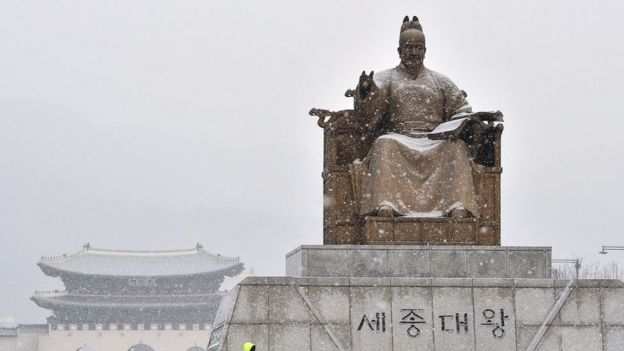 GETTY IMAGES
GETTY IMAGESKing Sejong the Great, whose statue sits at the heart of Seoul, decreed that a new alphabet should be created for his people. Around that time, he was wise enough to decree that a new alphabet should be created for the language of his subjects. At his royal instruction, what is now called Hangul in South Korea and Chosongul in North Korea was invented "for the instruction of the people".
It is an alphabet of a mere 28 letters, in contrast to the 3,000 or so Chinese characters. Korean had been spoken before but only written through the Chinese script.
Thanks to King Sejong, the people were given the means to read and write easily.
And as a result of this, one saying goes: "A wise man can acquaint himself with the Korean characters before the morning is done; a stupid man can learn them in the space of 10 days."
Is Korean really any easier to learn than other languages?
Linguists sometimes say that no language is inherently easier to learn than others. Prof Robert Fouser, formerly of Seoul National University, says: "The degree of difficulty in learning Korean depends on which languages the learner already knows."
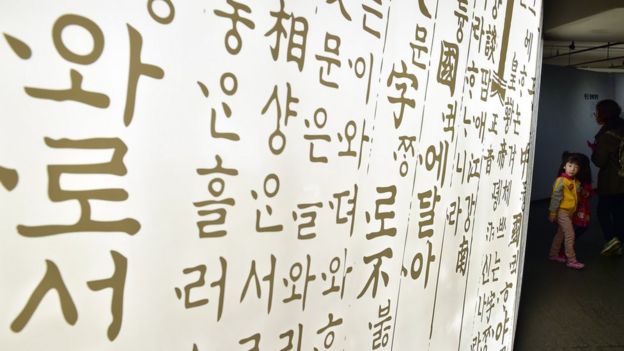 GETTY IMAGES
GETTY IMAGESHangul, Korea's phonetic alphabet, was meant to give its people the means to read and write easily. We find languages easy to learn when they are close to the language we already understand. Prof Fouser said that Korean has borrowed many words from Chinese: "The two languages thus share a common vocabulary, but a different word order and grammatical structure.
"Chinese learners of Korean may find Korean grammar as difficult as an English-speaking learner but would no doubt find the vocabulary easy to learn."
But what about English-speakers? The Foreign Service Institute, which teaches languages to American diplomats, puts Korean in the "exceptionally difficult" category.
It reckons that an English-speaker needs 575 to 600 hours of tuition (over 23 or 24 weeks) to learn languages with similarities to English (Afrikaans, Danish, Dutch, French, Italian, Norwegian, Portuguese, Romanian, Spanish and Swedish), but 2,200 hours to reach a similar standard of "general professional proficiency" in speaking and reading Korean.
But don't be put off
Donovan Nagel, a linguist and translator from Australia who has mastered more than a dozen languages, told the BBC he learnt Korean while he was in Korea for just over a year. He said he was "communicating fairly well after three or four months and was 'comfortably' fluent by the eight month mark".
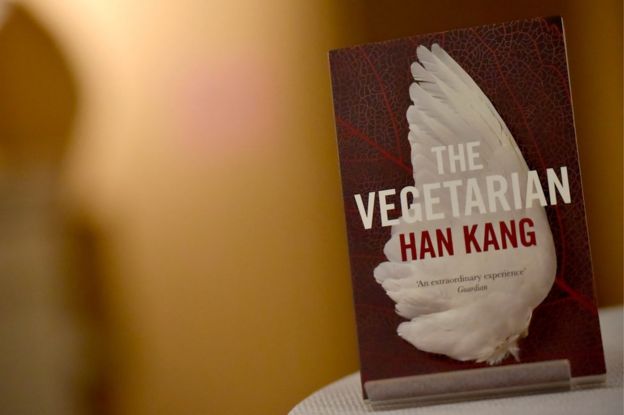 EPA
EPAThe book focuses on the strain that a woman's decision to become vegetarian - and her husband's refusal to accept it - puts on their marriage There are pros and cons: the grammar is straightforward. "For the most part Korean is usually pronounced exactly the way it's written, unlike English which is full of words that sound nothing like the way they appear on paper". Think "Leicester" or "Hermione" or, for that matter, "plough" and "cow" or "laughter" and "slaughter" or "take a bow" but "tie a bow".
The verbs in Korean, he says, are a cinch: "Many Korean verbs are actually just nouns connected to the verb to do. For example, to be happy is literally happiness + do = doing happiness."
But translation isn't just learning a language. It is also a creative process and this is why the translator of The Vegetarian could share the prize.
The Vegetarian is a book about about a woman who gives up eating meat in a quest to reject human brutality, but it proves a controversial decision and she becomes subject to the cruelty of her family. It was described by the judges as "uncanny blend of beauty and horror".
It is told in three voices, from three perspectives and the judges said it found "absolutely the right voice in English".
One Korean reader of the novel in both languages told me that the English version is, in its own way, as good a read as the original. He likens translation to a violinist playing a tune hummed by someone else - the vibrato and ornament change the original work, sometimes for the better, sometimes for the worse.
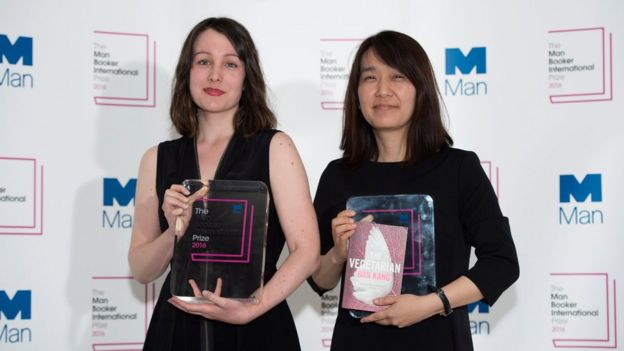 EPA
EPAIt was the first book Han Kang (right) had published in English Deborah Smith said she had tried to capture the "rhythm" of the book: "If you're translating a great work of Korean literature, then your translation has to be a great work of English literature, and there's no use quibbling over syntax if that's only going to be hindrance".
The translator deserved the prize. So would King Sejong.
** 기사에 대한 소감 **
1. 조선시대에 세종처럼 국민을 생각했던 통치자가 있었는가하면, 선조처럼 열등의식에 사로잡혀 이율곡의 합당한 건의를 물리쳤을 뿐만 아니라 임진왜란 당시 큰 공을 세운 이순신 장군을 세 차례나 고문하게 했던 어리석은 통치자도 있다.
2. 현대사에서도 이승만은 6.25 전쟁 당시 한강다리를 폭파하고 거짓방송을 하여 국민들을 속였다. 국민을 진정으로 생각하는 마음이 있었을까 의심스럽게 만드는 행위였다. 국부의 자격이 있다고 말할 수 있을까? 제 자식을 버리는 인간이 아버지 소리 들을 수 있는가? 이런 경우는 아버지가 아니라 금수만도 못한 인간이라 불린다.
3.한강氏의 작품을 번역한 영국 여성 Deborah Smith은 참으로 대단한 사람이다. 2010년에 독학으로 어려운 한국어 공부를 시작하여 6년 만에 번역으로 세계적으로 권위있는 상을 받았으니 말이다. 더구나, 그녀는 아무도 관심을 주지 않는 분야인 한국어에 뛰어들어 큰 성과를 내었으니 말이다.
4. 우리 역시 아무도 관심을 두지 않는 분야에 열정을 쏟아야겠다. 남들이 이 분야가 좋다니까 아무런 비판적 생각 없이 우르르 몰려가는 행태를 청산해야 한다. 인기 있는 분야를 추구하지 않고, 오히려 비인기 분야를 추구하다 인기를 얻게 된 케이스가 이번 한강씨의 수상이고, 한강씨의 작품을 번역한 데보라 스밋양이 바로 그런 경우에 해당되지 않는가?
'국제문제 > 아시아' 카테고리의 다른 글
(아시아/인도) 인도 가뭄 해결 위해 강물 줄기 돌린다 (0) 2016.05.18 (아시아) 한강의 <채식주의자> 맨부커(Man Booker)賞 수상 (0) 2016.05.17 (아시아/방글라데시) 방글라데시 번개 맞아 50명 사망 (0) 2016.05.15 (아시아/몽고) 몽고의 혹한 드줏 (0) 2016.05.15 (아시아) New York Times: 북한사람들은 도대체 정신나간 사람들인가? (0) 2016.05.13